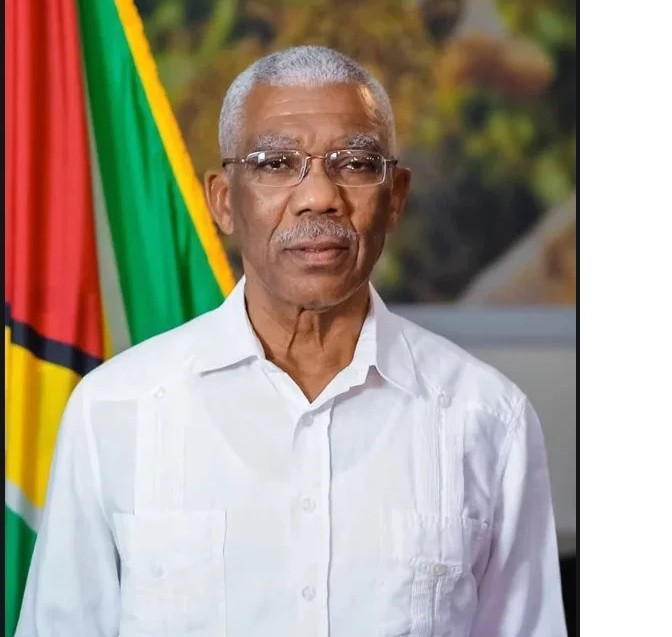President David Granger yesterday announced that from midnight tonight all places of entertainment including bars and restaurants are to be closed from 6 pm to 6 am as part of measures to reduce community spread of the novel coronavirus (COVID-19).
In an address to the Nation, his third on the issue of COVID-19, Granger said that Government is working assiduously to combat the deadly disease and expressed gratitude to the individuals, institutions, religious organization and business enterprises which have initiated action to protect citizens and prevent the spread of the disease.
“This is as it should be; fighting the pandemic requires the continuous, collective action of all citizens and the entire country,” he stressed before reminding of the efforts by government to address the pandemic.
He reiterated that citizens should avoid leaving home; avoid gatherings of more than five persons; avoid visiting sick persons; avoid touching other persons; avoid touching parts of their own faces; and wash hands frequently and thoroughly in water.
Aside from these advisories the President announced that government has crafted and disseminated the ‘National Response’ to the Coronavirus 2019.
According to Granger this response was completed by the National COVID-19 Task Force which is led by the Prime Minster and includes the Attorney General and Ministers of Public Health, Public Security, Finance, Foreign Affairs, Education, Communities, Public Infrastructure, Natural Resources and Citizenship.
He did not make public this response nor indicate when it would be publicized but did note that some of its measures will be implemented from April 3 until further notice.
Specifically government will close public gathering at places of entertainment, including bars, clubs, gymnasiums, night clubs, restaurants and swimming pools, between the hours of 18:00 hours and 06:00 hours.
“Additional restrictions to safeguard public health will be announced from time to time as the needs arise [and] the measures that have already been implemented will remain in place until further notice,” Granger announced.
Measures already implemented include the closure of the University of Guyana’s campuses and other schools, the postponement of the National Grade Six Assessment (NGSA), closure of the Cheddi Jagan and the Eugene F. Correia International airports, closure of seaports to international vessels except merchant ships, suspension of travel to countries which border Guyana, a shift system of duty for Public Servants and a waiver of the Value Added Tax (VAT) on medical supplies associated with the testing, prevention and treatment of COVID-19 as well as the suspension of visits to elder care facilities.
These measures the President reiterated are expected to protect the health and safety of the Guyanese people; protect vulnerable persons in special-care homes and shelters; prevent community spread to local and hinterland areas; reduce or mitigate the spread in affected areas; restrict or halt imported cases into the country; restrict and contain the spread of the disease in heavily -populated areas; ensure on-the-job safety of all medical and technical staff; reinforce measures to mitigate the social and economic impact on the livelihood of vulnerable persons; and coordinate the efforts of civic and non-governmental organisations.
Notably while the National measures announced mimic those already implemented by several local government authorities it falls short of others implemented in municipalities such as Corriverton which has completely prohibited dining and drinking in bars or restaurants.
The Corriverton Mayor and Town Council announced that from April 1, 2020 until further notice all religious organizations and public gatherings are limited to three persons who must maintain a social distance of three to six feet.
Additionally all road side vending was suspended to ensure public safety and dining and drinking at bars or restaurants was prohibited.
“Only take away services should be provided and businesses should be closed 4 pm. All other business entities should be closed at 5 pm [excepting] pharmacies which must close at 6 pm,” they announced.
In New Amsterdam non-essential businesses such as corner-side bars and beauty parlours have been completely closed while supermarkets and grocery shops have been given a 4:30 pm curfew.
Bartica meanwhile has announced the enforcement of “stay at home” measures.
According to Bartica Mayor Gifford Marshall his council was concerned that a reduction in the hours for services would lead to more gatherings.
“We felt that a curfew would not be helpful. We didn’t want persons on the roads during the day congregating and possibly spreading the virus. Instead we wish to enforce social distancing all day and encourage persons to stay home unless it‘s absolutely necessary,” he explained.
It is also significantly less comprehensive than measure issued regional by governments such as in Trinidad and Tobago which direct that citizens must adhere to Stay at Home orders from Tuesday, March 30 to Wednesday, April 15.
The decree from Minister of National Security Stuart Young noted that only essential services that are vital to keeping the country operational will remain available.
These services include primary emergency and protective services, Police Service and the Defence Force, Fire Services, Basic services concerning the provision of health, hospital, water, electricity, fire, sanitation, civil aviation, telecommunications and funeral homes, supermarkets, convenience stores, corner shops, discount stores, pharmacies and bulk stores, that supply food and pharmaceutical items, Public transportation of water taxis, ferries and motor vehicles and buses (only operating at a 50% capacity) as well as restaurants (only take-away and delivery, no dine-in) as well as services related to food production, agriculture, fisheries, and animal care.
In Jamaica a nightly curfew from 8 pm to 6 am has been in place since April 1 for all of the island.
Those exempted from the all-island nightly curfew include members of the Houses of Parliament and persons employed to Parliament, any person employed in a service concerning the provision of health, water, electricity, public works, sanitation, firefighting, civil aviation or telecommunications, immigration Officers and Customs Officers and persons employed in the transportation of agricultural produce or livestock or employed in the poultry industry.





